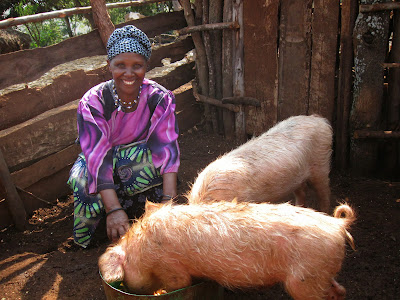 |
| Learning how to construct energy-saving stoves |
Women in rural communities have to walk increasingly long distances to look for firewood. This is a tedious, time-consuming burden for women and girls and detracts from time spent in girls going to school and women participating in activities that will generate income. From an environmental perspective, the use of large amounts of firewood for cooking has contributed to problems of deforestation leading to soil erosion and land degradation -- undermining agricultural efforts to produce food.
 |
| three-stone fire |
The local three stone fireplace is the most common method of cooking in rural Tanzania. It is easy to construct and requires no investment of time or money. It uses a wide range of fuel sources but a lot of heat and fuel are wasted, a considerable amount of smoke is produced and children are prone to serious accidents due to the open features of the fireplace.
Back when CPAR Tz first started working in Karatu District, we learned that various models of energy saving stoves had been introduced but none had been widely adopted. We wanted to promote energy saving stoves because they use about one-third the firewood of the three-stone fireplace, so we decided to consult with rural women to find out why the stoves weren’t popular.The women complained that they couldn’t roast maize, the stoves didn’t produce enough light and the intensity of the heat tended to destroy their pots. Furthermore, they were expensive to construct because they used cement and burnt bricks. And, the women objected to the use of chimneys because, as they pointed out, a little smoke is a good thing to keep snakes and scorpions out of your house.
CPAR Tz shared this information with women from the Arusha-based Centre for Agricultural Mechanization and Rural Technology (CAMARTEC) who had already worked to design an energy saving stove that addressed women’s concerns. In addition, they had taken “kitchen management” to a whole new level by tackling women’s comfort and efficiency in the kitchen.
 |
| Testing the soil |
Since that time, we have promoted mud cookstoves (“Mkombozi”) that women can build and maintain themselves using locally available materials -- clay soil or ant hill soil, fresh cow dung, “lomay" (a local tree that produces a jelly like substance used as a binding agent), gravel and water.
 |
| Mixing the goop |
These same local materials are used to construct stools so that women can sit comfortably while cooking, and can be used to construct shelves so that kitchen utensils can be tidily stored and easily accessible.
 |
| Using wood and paint containers |
The tools required to construct the stoves are a knife or machete, a bucket, two pots or paint tins of 5 liter capacity and a piece of flat wood for compacting the soil. With the exception of the paint tins and flat wood, all are readily available at the household level. The paint tins and flat wood can be procured for about $2 and then continuously recycled to other households. All the necessary measurements are calculated using one’s hands.

As part of the “kitchen management” training, women learn to keep the kitchen clean, arrange kitchen items conveniently, maintain the stove, store firewood properly, keep cooking utensils covered and sprinkle the earth floors with a bit of water before sweeping to minimize the dust. They learn energy saving tips such as reducing the firewood once the food has come to a boil, covering the pot with a lid whenever possible, avoiding overcooking, soaking raw foods such as maize and beans before cooking, chopping certain foods into small sizes before cooking, using dried wood for less smoke and better use of energy, and preparing everything first before lighting the stove.
Traditional Iraqw houses don’t have windows so cooking over the three-stone fire fills the house with smoke. The Mkombozi stoves are constructed, at women’s request, in place of their three-stone fires. It’s easy to see on the mud wall exactly where the smoke hits so, keeping in mind that some smoke in the house is desirable, the women are encouraged to put in a small window so that a lot of the smoke can escape.
 |
| Demonstration -- although this pot should ideally be covered... |
 |
| Cooking stew and roasting maize |
Results from using the energy-saving stoves include use of 3 sticks of firewood instead of 10; faster cooking times; the ability to leave food cooking on the stove and tend to other activities; far less smoke leading to a reduction in eye inflammation and respiratory problems. One unexpected result was that some of the women trained have been able to turn their new skills into an income-generating activity. Our most recent training was facilitated by Rosalia, one of the first women trained by CPAR Tz in 2004. She even makes small modifications to the stove to make it more user friendly, e.g. making the burners two different sizes to accommodate the variety of pots found in households.
 |
| Rosalia (left) instructing Sabina |
.jpg)








